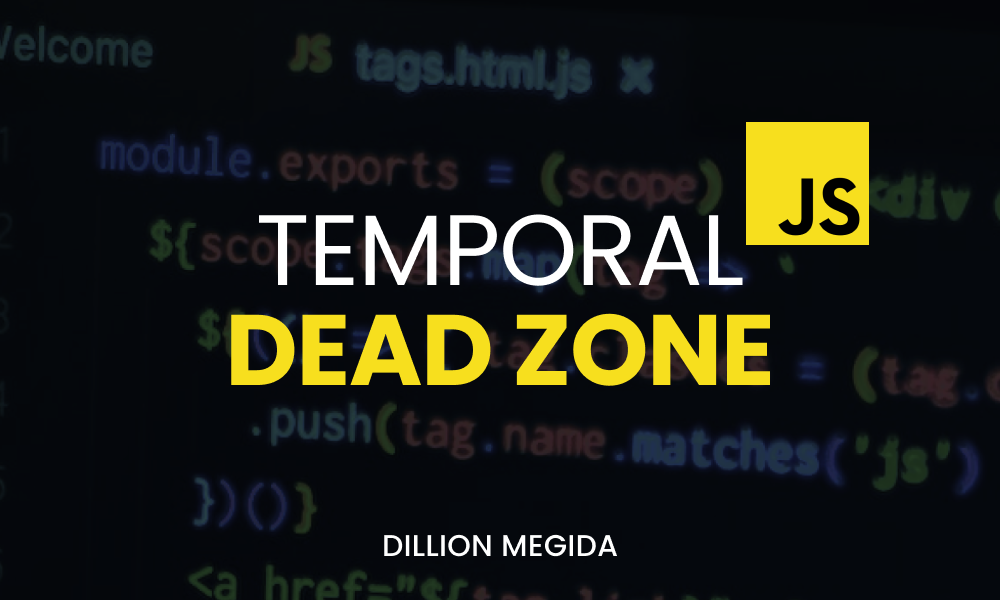The Temporal Dead Zone in JavaScript, Simplified
April 28th, 2023

Here's a video if you'd prefer that: https://youtu.be/Cad46WAHApY
The Temporal Dead Zone, abbreviated as TDZ is a concept that applies to JavaScript variables. What does this concept mean? I'll explain that in this article using examples.
The TDZ of a variable declared in your JavaScript code is the area where the variable is hoisted but inaccessible until it is initialized with a value. This concept applies to variables declared with let and const (but not var).
Let's see a code example:
console.log(myName)
// undefined
var myName = "Dillion"
console.log(myName)
// DillionHere, we declare a variable called myName with a string value of "Dillion" (because that's my name 😁). Did you notice we try to access the variable even before it was declared in the code? At the first line, we execute console.log(myName). But, we do not get an error. Instead, we get undefined logged to the console.
What happens here is that myName is hoisted. But, by using the var keyword, the variable is hoisted with a default value of undefined. When we try to access myName after the declaration line in the code has been executed, we now get "Dillion".
Let's say we used let here:
console.log(myName)
// ReferenceError: Cannot access 'myName' before initialization
let myName = "Dillion"
console.log(myName)Now we get an error: a reference error--Cannot access 'myName' before initialization. The error does not say "myName is not defined", which means the interpreter "knows" of a variable called "myName". But that variable does not have a default value, which makes it inaccessible. This is where the concept of temporal dead zone lies.
Temporal Dead Zone in Global Scope
myName is declared in the global scope, therefore it is hoisted to the top of the global scope. The area between the top of the global scope and the line of declaration of the variable is the temporal dead zone. The variable is inaccessible in this zone
Here's what it looks like on the code:
console.log(myName) // temporal dead zone for myName
// temporal dead zone for myName
// temporal dead zone for myName
// temporal dead zone for myName
// temporal dead zone for myName
// temporal dead zone for myName
// temporal dead zone for myName
let myName = "Dillion"Attempting to access myName in this zone would throw "cannot access myName before initialization". myName is only accessible from the line it was initialized in the code:
console.log(myName) // temporal dead zone for myName
// temporal dead zone for myName
// temporal dead zone for myName
// temporal dead zone for myName
// temporal dead zone for myName
// temporal dead zone for myName
// temporal dead zone for myName
let myName = "Dillion" // now accessible
// now accessible
// now accessible
// now accessibleTemporal Dead Zone in Function Scope
TDZ also applies in function scope. Let's see an example:
function print() {
console.log(myName)
let myName = "Dillion"
}
print()
// ReferenceError: Cannot access 'myName' before initializationAgain here, we get a reference error: Cannot access 'myName' before initialization. We try to access myName before the line it was declared. Though myName is hoisted to the top of the local scope (since it is declared in a function), it remains inaccessible until the line where it is initialized is executed. The area where it is hoisted but not accessible is the temporal dead zone:
function print() {
// temporal dead zone for myName
// temporal dead zone for myName
// temporal dead zone for myName
// temporal dead zone for myName
console.log(myName) // temporal dead zone for myName
// temporal dead zone for myName
// temporal dead zone for myName
let myName = "Dillion"
}
print()You can only access myName without errors after initialization:
function print() {
// temporal dead zone for myName
// temporal dead zone for myName
// temporal dead zone for myName
// temporal dead zone for myName
console.log(myName) // temporal dead zone for myName
// temporal dead zone for myName
// temporal dead zone for myName
let myName = "Dillion" // now accessible
}
print()Temporal Dead Zone in Block Scope
Unlike with var, variables declared with let and const have a block scope. A block is created with open and closed curly brackets: {...}.
You'd find blocks in if, switch and loop statements to name a few:
if(condition) {
// block
}
switch(expression) {
// block
}
for (...) {
// block
}Declaring variables with let and const in these blocks would make those variables have a block scope. Such variables would not be accessible outside the block.
Blocks also exist in functions since they have curly brackets, but the scope in them is better referred to as function scope or local scope.
let and const variables are also hoisted to the top of the block scope, but the temporal dead zone also applies. Let's see an example:
{
console.log(myName)
let myName = "Dillion"
}
// ReferenceError: Cannot access 'myName' before initializationWe get the same reference error. myName is hoisted to the top of the block scope, but remains inaccessible until the variable is initialized with a value; the temporal dead zone:
{
// temporal dead zone for myName
console.log(myName) // temporal dead zone for myName
// temporal dead zone for myName
// temporal dead zone for myName
// temporal dead zone for myName
// temporal dead zone for myName
// temporal dead zone for myName
let myName = "Dillion" // now accessible
// now accessible
// now accessible
}After initialization, the variable becomes accessible.
I hope this post simplifies the temporal dead zone for you. Please share :)
